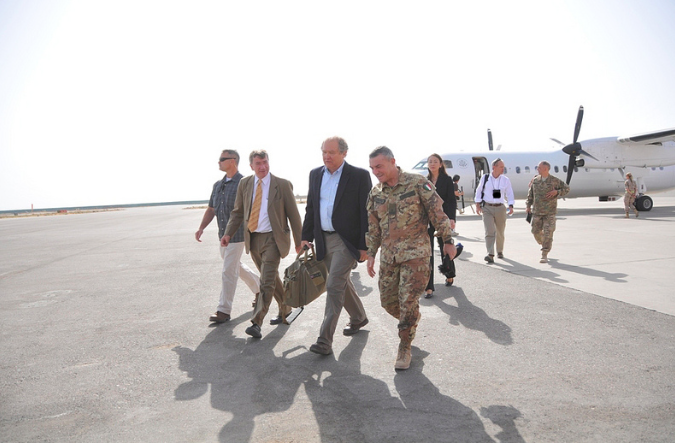
There’s a disturbing and unprecedented new report from the Special Inspector General for Afghanistan Reconstruction (SIGAR) John Sopko.
In his regular report to Congress, Sopko says he is unable to do his job accounting for spending of US taxpayer money in Afghanistan due to obstruction from key federal agencies that have the information.
The obstructing agencies Sopko named are the U.S. Agency for International Development (USAID) and the Treasury Department, which he says have reused all cooperation with his agency; and the State Department, which he says is only provided selective information.
Sopko, who was appointed to his watchdog position by President Obama, says the US remains Afghanistan’s single largest donor since the takeover of the Islamic extremist Taliban after the Biden Administration’s botched and deadly withdrawal in August 2021. US taxpayers provided more than $1.1 billion to support the Afghan people.
For now, Sopko told Congress, how it’s been spent is anybody’s guess.
Below are highlights from the SIGAR’s report to Congress.
— The United States remains Afghanistan’s single largest donor, providing more than $1.1 billion in assistance to support the Afghan people since the Taliban takeover in August 2021. However, SIGAR, for the first time in its history, is unable this quarter to provide Congress and the American people with a full accounting of this U.S. government spending due to the non-cooperation of U.S. agencies. USAID and the Treasury Department refused to cooperate with SIGAR in any capacity, while the State Department was selective in the information it provided pursuant to SIGAR’s quarterly data requests.
— The report features a spotlight essay examining the stifling of one of the most remarkable achievements of reconstruction in Afghanistan: the development of an independent Afghan media (Pages 3-16). Reporters Without Borders said in August that Afghanistan has lost almost 40% of its media outlets and 60% of its journalists since the Taliban takeover. They also reported that 231 media outlets have closed in Afghanistan since August 2021, and 60% of journalists have lost their jobs (around 6,400 people), including 84% of women journalists.
— UNICEF estimates that over three million girls who previously attended secondary school have been denied their right to education in the year since the Taliban took power. UNICEF estimates that the Taliban ban on girls’ secondary education may end up costing the Afghan economy up to $5.4 billion in lifetime earnings potential.
— On October 11, the State Department announced visa restrictions for current or former Taliban members, members of non-state security groups, and other individuals believed to be responsible for, or complicit in, the repression of and violence against Afghan women and girls.
— For 10 consecutive months, more than 90% of the Afghan population has experienced insufficient food consumption, according to a June report by the UN’s World Food Programme (WFP). All 34 provinces in Afghanistan are facing crisis or emergency levels of acute food insecurity. In total, an estimated 18.9 million Afghans face potentially life-threatening levels of hunger—including nearly six million facing near-famine conditions—from June to November 2022.
— Nearly half the Afghan population continues to employ crisis-coping strategies, such as rationing out food or skipping meals, to meet their basic needs. Households headed by women remain especially vulnerable, with an estimated 96% facing insufficient food consumption amid Taliban restrictions on the movements of women and girls. Women are twice as likely as men to sacrifice their own meals so their families can eat, WFP reported.
— On September 14, the U.S. Departments of Treasury and State jointly announced the establishment of the Fund for the Afghan People—also known as “The Afghan Fund”— a financial mechanism for the protection, preservation, and targeted disbursement of $3.5 billion from the frozen Afghan central bank assets held in U.S. financial institutions to support economic stability in Afghanistan. According to State, the Fund is “explicitly not intended to make humanitarian disbursements.” The Afghan Fund will maintain its account with the Bank for International Settlements in Switzerland and be governed by a Board of Trustees.
— Over half of Afghanistan’s population (an estimated 24.4 million Afghans) is in need of humanitarian assistance. On August 29, Martin Griffiths, UN’s Under-Secretary-General for Humanitarian Affairs and Emergency Relief Coordinator, told the UN Security Council that the $4.4 billion Humanitarian Response Plan for Afghanistan “has a gap of $3.14 billion, with over $600 million urgently required to support priority winter preparation, such as upgrades and repairs to shelter, warm clothes, blankets and so forth. But we are up against time. These particular contributions are needed within the next three months.”
— On September 15, the WFP reported needing $1.14 billion in additional funding to sustain its operations over the next six months (October 2022—March 2023), in addition to $172 million to preposition food in rugged and remote areas before winter sets in.
— The Afghan economy contracted by an estimated 20% since August 2021, while potentially having lost as many as 700,000 jobs. A U.S. Institute for Peace analyst warned, there is “no prospect for the economy to resume high growth let alone recover to pre-2021 levels in the foreseeable future.”
— Since February, the UN has been attempting to establish a humanitarian exchange facility that would allow the UN and aid groups to swap millions in U.S. dollar-denominated aid for afghanis held in the country by private businesses, to act as a stopgap measure until the Afghan central bank is able to operate independently. The exchange would be structured so that the funds entirely bypass Taliban authorities, although the facility would require the approval of the Taliban-run central bank before it could operate. Such proposals have so far failed, reportedly due to Taliban intransigence.
— On July 31, the United States killed al-Qaeda leader Ayman al-Zawahiri with a missile fired from a drone. It was the first reported U.S. drone strike in Afghanistan since August 29, 2021. The Taliban condemned the operation as a violation of “international principles” and of the 2020 Doha Agreement. U.S. Secretary of State Antony Blinken said the Taliban had “grossly violated” the Doha Agreement by sheltering al-Zawahiri.
— Exacerbating the humanitarian crisis, severe flash flooding struck central, southern, and eastern Afghanistan in late August, impacting a UN-estimated 15,875 people, with 256 people killed and over 5,600 houses destroyed or damaged. The UN also said floods damaged 34,000 hectares of agricultural land and killed 7,500 livestock, impacting the livelihoods of thousands of farmers in the middle of the summer harvest season.
— On September 27, the Taliban announced they had signed a provisional deal with Russia to import one million tons of gasoline, one million tons of diesel, 500,000 tons of liquefied petroleum gas, and two million tons wheat to Afghanistan annually. This is the Taliban’s first known major international economic deal since they seized power.
— According to the World Bank, the Taliban collected an estimated 104 billion AFN (around $1.2 billion) in total revenue between December 22, 2021, and August 2022. Taxes at the borders comprised 57% of the total revenue collected up to August 2022, with revenue from inland sources accounting for the remaining 43%.
— In June, the Taliban appeared to be actively enforcing their April 3rd ban on narcotics. State Department, citing open-source reporting, reported that the Taliban had begun destroying poppy fields to enforce the ban. However, farmers in southern provinces have recently reported that the Taliban are not interfering with the fall opium-poppy planting.
— The Taliban Ministry of Labor and Social Affairs declared August 15, the anniversary of the day the Taliban captured Kabul, a public holiday. A brief Taliban announcement said, “August 15 is a national holiday in the country to mark the first anniversary of the victory of the Afghan jihad against America and its allies’ occupation.”

Visit The Sharyl Attkisson Store
Cool Products for Free Thinkers
Support Independent Journalism







